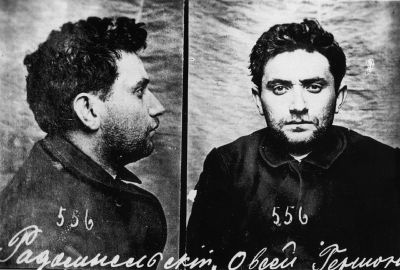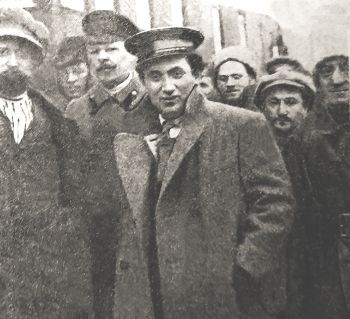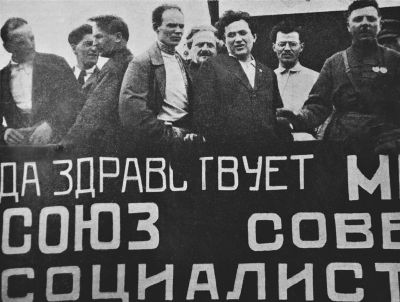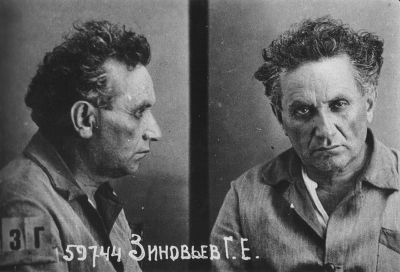Grigory Zinoviev
| Grigory Zinoviev | |
(2).jpg/250px-Grigorii_Zinovieff_1920_(cropped)(2).jpg) Zinoviev in 1920 | |
Chairman of the Communist International
| |
| In office March 2, 1919 – November 22, 1926 | |
| Preceded by | Position created |
|---|---|
| Succeeded by | Nikolai Bukharin |
Chairman of the Petrograd Soviet
| |
| In office December 13, 1917 – March 26, 1926 | |
| Preceded by | Leon Trotsky |
| Succeeded by | Office abolished |
Full member of the 6th, 10th, 11th, 12th, 13th, 14th Politburo
| |
| In office October 10 – November 29, 1917 | |
| In office March 16, 1921 – June 2, 1924 | |
Candidate member of the 8th, 9th Politburo
| |
| In office March 25, 1919 – March 16, 1921 | |
| Born | September 23 1883 Yelizavetgrad, Russian Empire (now Kropyvnytskyi, Ukraine) |
| Died | August 25 1936 (aged 52) Moscow, Russian SFSR, Soviet Union |
| Political party | RSDLP (1901–1903) RSDLP (Bolsheviks) (1903–1918) Russian Communist Party (Bolsheviks) (1918–1927, 1928–1932, 1933–1934) |
Grigory Yevseyevich Zinoviev Russian: Григорий Евсеевич Зиновьев, Russian pronunciation: [ɡrʲɪˈɡorʲɪj (j)ɪfˈsʲe(j)ɪvʲɪdʑ zʲɪˈnovʲjɪf]. Transliterated Grigorii Evseevich Zinov'ev according to the Library of Congress system. (born Hirsch Apfelbaum, September 23 [O.S. September 11] 1883 – August 25, 1936), known also under the name Ovsei-Gershon Aronovich Radomyslsky (Russian: Овсей-Гершен Аронович Радомысльски), was a Soviet revolutionary and politician. He was an Old Bolshevik and a close associate of Vladimir Lenin. During the 1920s, Zinoviev was one of the most influential figures in the Soviet leadership and the chairman of the Communist International.
Born in Ukraine to a Jewish family, Zinoviev began revolutionary activities by joining the underground Russian Social Democratic Labor Party (RSDLP) in 1901. In 1903 the RSDLP split between the Menshevik faction led by Julius Martov and the Bolsheviks led by Vladimir Lenin. Zinoviev joined Lenin's faction, becoming one of the original Bolsheviks. As a Bolshevik, Zinoviev engaged in revolutionary activities both in Russia and abroad and became known for his fierce loyalty to Lenin.
In 1917 the Bolsheviks seized power following the October Revolution and established their own government, the RSFSR. Bolshevik seizure of power ultimately led to a civil war within Russia. Communist parties across Europe, galvanized by World War I and the October Revolution attempted to seize power in their respective countries. Demands for supplies and aid goaded Lenin into creating the Communist International in 1919, to distribute aid to these fledgling communist movements. The Communist International, led by Zinoviev, both aided existing communist parties and attempted to create new ones.
Efforts to mobilize communist revolution abroad ended in failure as communist movements abroad failed to seize power. Zinoviev's leading role in these efforts vilified him in the international eye. His reputation as a subversive led to a political scandal in the United Kingdom. Prior to the 1924 Parliamentary election, Zinoviev allegedly authored a letter that claimed the Soviet Union was using the Labor Party to erode British democracy and initiate a communist revolution in the UK.
Early Career
Before the Revolution (1901–1917)
Grigory Zinoviev was born in Yelizavetgrad, Russian Empire (now Kropyvnytskyi, Ukraine), to Jewish dairy farmers, who educated him at home. His name at birth was Ovsei-Gershon Aronovich Radomyslsky (Russian: Овсей-Гершен Аронович Радомысльски). He was the oldest son born to Aron and Reizy Radomyslsky.[1] Between 1924 and 1934 the city was known as Zinovyevsk (Ukrainian: Зінов'євськ [zʲinɔvɛ́vsʲk]). Grigory Zinoviev was also known in early life under the name Hirsh Apfelbaum. He later adopted several aliases, such as Shatski, Grigoriev, Grigori, and Zinoviev. He is most frequently called the latter two.
He studied philosophy, literature and history. He became interested in politics and joined the Russian Social Democratic Labor Party (RSDLP) in 1901. He was a member of its Bolshevik faction from the time of its creation in 1903. Between 1903 and the collapse of the Russian Empire in February 1917, he was a leading Bolshevik and one of Vladimir Lenin's closest associates, working both within Russia and abroad as circumstances permitted. He was elected to the RSDLP's Central Committee in 1907 and sided with Lenin in 1908 when the Bolshevik faction split into Lenin's supporters and Alexander Bogdanov's followers. Zinoviev remained Lenin's constant aide-de-camp and representative in various socialist organizations until 1917.
1917
Zinoviev spent the first three years of World War I in Switzerland. After the Russian monarchy was overthrown during the February Revolution, he returned to Russia in April 1917 in a sealed train with Lenin and other revolutionaries opposed to the war. He remained a part of the Bolshevik leadership throughout most of that year, spending time with Lenin after being forced into hiding in the period following the July Days. However, Zinoviev and Lenin soon had a falling out over Zinoviev's opposition to Lenin's call for an open rebellion against the Russian Provisional Government. On October 10, 1917 (Julian calendar), he and Lev Kamenev were the only two Central Committee members to vote against an armed revolt. Their publication of an open letter opposing the use of force enraged Lenin, who demanded their expulsion from the party.[2]
On October 29, 1917 (Julian calendar), immediately after the Bolshevik seizure of power during the October Revolution, the executive committee of the national railroad labor union, Vikzhel, threatened a national strike unless the Bolsheviks shared power with other socialist parties and dropped Lenin and Leon Trotsky from the government. Zinoviev, Kamenev, and their allies in the Bolshevik Central Committee argued that the Bolsheviks had no choice but to start negotiations since a railroad strike would cripple their government's ability to fight the forces that were still loyal to the overthrown Provisional Government. Although Zinoviev and Kamenev briefly had the support of a Central Committee majority and negotiations were started, a quick collapse of the anti-Bolshevik forces outside Petrograd allowed Lenin and Trotsky to convince the Central Committee to abandon the negotiating process. In response, Zinoviev, Kamenev, Alexei Rykov, Vladimir Milyutin, and Victor Nogin resigned from the Central Committee on November 4, 1917 (Julian calendar). The following day, Lenin wrote a proclamation calling Zinoviev and Kamenev "deserters."[3] Lenin never forgot this conflict, eventually making an ambiguous reference to their "October episode" in his Testament.[4]
The Civil War (1918–1920)
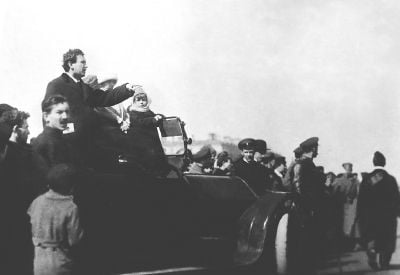
Zinoviev soon returned to the fold and was once again elected to the Central Committee at the VII Party Congress on March 8, 1918. He was put in charge of the Petrograd (Saint Petersburg before 1914, Leningrad 1924–91) city and regional government.
Sometime in 1918, while Ukraine was under German occupation, the rabbis of Odessa ceremonially anathematized (pronounced herem against) Trotsky, Zinoviev, and other Bolshevik leaders of Jewish descent in the synagogue.[5]
Shortly after the assassination of Petrograd Cheka leader Moisei Uritsky in August 1918 and the commencement of the five year Red Terror period of political repression and mass killings, Zinoviev said:
To overcome our enemies we must have our own socialist militarism. We must carry along with us 90 million out of the 100 million of Soviet Russia's population. As for the rest, we have nothing to say to them. They must be annihilated.[6]
He became a non-voting member of the ruling Politburo when it was created after the VIII Congress on March 25, 1919. He also became the Chairman of the Executive Committee of the Comintern when it was created in March 1919. It was in this capacity he presided over the Congress of the Peoples of the East in Baku in September 1920[7] and gave his famous four-hour speech in German at the Halle congress of the Independent Social Democratic Party of Germany in October 1920.[8]
Zinoviev was responsible for Petrograd's defense during two periods of intense clashes with White forces in 1919. Trotsky, who was in overall charge of the Red Army during the Russian Civil War, thought little of Zinoviev's leadership, which aggravated their strained relationship.
Rise to the top (1921–1923)
In early 1921, when the Communist Party was split into several factions, and policy disagreements were threatening the unity of the Party, Zinoviev supported Lenin's faction. As a result, Zinoviev was made a full member of the Politburo after the Xth Party Congress on March 16, 1921, while members of other factions, such as Nikolai Krestinsky, were dropped from the Politburo and the Secretariat.
Zinoviev was one of the most influential figures in the Soviet leadership during Lenin's final illness in 1922–23 and immediately after his death in January 1924. He delivered the Central Committee's reports to the XIIth and XIIIth Party Congresses in 1923 and 1924, respectively, a role that Lenin had previously played. He was also considered one of the Communist Party's leading orators and theoreticians.[9] 1925 signaled a shift from the immediate activity of world revolution towards a defense of the Soviet state. In that year, Joseph Stalin adopted the thesis of "Socialism in one country." One of the main functions of the Comintern was Bolshevization, a policy of postponing proletarian revolutions in other countries in order to emphasize unconditional support for the Kremlin's foreign policy. The Comintern closely supervised many national parties, and reorganized them along Soviet lines, with a healthy dose of Soviet political rhetoric as well.[10]
Factional infighting
With Stalin and Kamenev against Trotsky (1923–1924)
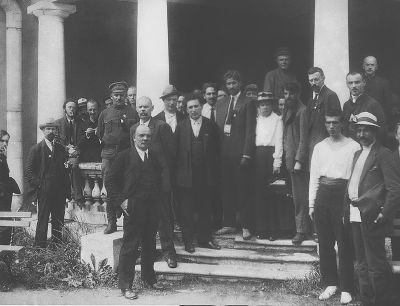
During Lenin's final illness, Zinoviev, his close associate Kamenev and Joseph Stalin formed a ruling 'triumvirate' (or 'troika') in the Communist Party, playing a key role in marginalizing Leon Trotsky. The triumvirate carefully managed the intra-party debate and delegate-selection process in autumn 1923, during the run-up to the XIIIth Party Conference, securing the vast majority of the seats. The Conference, held in January 1924 just before Lenin's death, denounced Trotsky and Trotskyism. Some of Trotsky's supporters suffered demotion or reassignment in the wake of his defeat. Zinoviev's power and influence seemed at its zenith. However, as subsequent events showed, his real power base was limited to the Petrograd/Leningrad Party organization, while the rest of the Communist Party apparatus came increasingly under Stalin's control.
After Trotsky's defeat at the XIIIth Conference, tensions between Zinoviev and Kamenev, on the one hand, and Stalin on the other became more pronounced and threatened to end their alliance. Nevertheless, Zinoviev and Kamenev helped Stalin retain his position as General Secretary of the Central Committee at the XIIIth Party Congress in May–June 1924 during the first controversy over Lenin's Testament.
After a brief lull in the summer of 1924, Trotsky published Lessons of October, an extensive summary of the events of 1917. In the article, Trotsky described Zinoviev's and Kamenev's opposition to the Bolshevik seizure of power in 1917, something that the two would have preferred left unmentioned. This started a new round of intra-party struggle, with Zinoviev and Kamenev once again allied with Stalin against Trotsky. Along with their supporters, they accused Trotsky of various mistakes and worse during the Russian Civil War. They damaged his military reputation so much that in January 1925 he was forced to resign as People's Commissar of Army and Fleet Affairs and as Chairman of the Revolutionary Military Council. Zinoviev demanded Trotsky's expulsion from the Communist Party, but Stalin refused to go along at that time and skillfully played the role of a moderate.
Break with Stalin (1925)
With Trotsky finally on the sidelines, the Zinoviev-Kamenev-Stalin triumvirate began to crumble early in 1925. The two sides spent most of the year lining up support behind the scenes. Stalin struck an alliance with Communist Party theoretician and Pravda editor, Nikolai Bukharin, and Soviet prime minister Alexei Rykov. Zinoviev and Kamenev allied with Lenin's widow, Nadezhda Krupskaya, and Grigory Sokolnikov, the Soviet Commissar of Finance and a non-voting Politburo member. The struggle became open at the September 1925 meeting of the Central Committee and in December 1925 came to a head at the XIVth Party Congress. With only the Leningrad delegation behind them, Zinoviev and Kamenev found themselves in a tiny minority and were soundly defeated. Zinoviev was re-elected to the Politburo, but his ally Kamenev was demoted from a full member to a non-voting member and Sokolnikov was dropped altogether, while Stalin had more of his allies elected to the Politburo. Within weeks of the Congress, Stalin wrested control of the Leningrad party organization and government from Zinoviev and had him dismissed from all regional posts, leaving only the Comintern as a possible power base for Zinoviev.
With Trotsky and Kamenev against Stalin (1926–1927)
During a lull in the intra-party fighting in the spring of 1926, Zinoviev, Kamenev and their supporters gravitated closer to Trotsky's supporters and the two groups soon formed an alliance, which also incorporated some smaller opposition groups within the Communist Party. The alliance became known as the United Opposition. In May 1926, Stalin, weighing his options in a letter to Vyacheslav Molotov, directed his supporters to concentrate their attacks on Zinoviev since the latter was intimately familiar with Stalin's methods from their time together in the triumvirate. Following Stalin's orders, his supporters accused Zinoviev of using the Comintern apparatus in support of factional activities (the Lashevich Affair). Zinoviev was dismissed from the Politburo after a tumultuous Central Committee meeting in July 1926. Soon after the office of the Comintern Chairman was abolished and Zinoviev lost his last important post.
Zinoviev remained in opposition to Stalin throughout 1926 and 1927, resulting in his expulsion from the Central Committee in October 1927. When the United Opposition tried to organize independent demonstrations commemorating the 10th anniversary of the October revolution in November 1927, the demonstrators were dispersed by force and Zinoviev and Trotsky were expelled from the Communist Party on November 12. Their leading supporters, including Kamenev, were expelled in December 1927 by the XVth Party Congress, which in early 1928 paved the way for the mass expulsions of rank and file oppositionists as well as internal exile of opposition leaders.
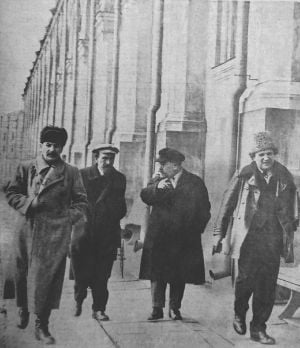
Submission to Stalin (1928–1934)
While Trotsky remained firm in his opposition to Stalin after his expulsion from the Party and subsequent exile, Zinoviev and Kamenev capitulated almost immediately and called on their supporters to follow suit. They wrote open letters acknowledging their mistakes and were readmitted to the Communist Party after a six-month cooling off period. They never regained their Central Committee seats, but they were given mid-level positions within the Soviet bureaucracy. Bukharin, then at the beginning of his short and ill-fated struggle with Stalin, courted Kamenev and, indirectly, Zinoviev during the summer of 1928. This was soon reported to Stalin and used against Bukharin as proof of his factionalism.
After once more admitting their supposed mistakes, they were readmitted to the Party in December 1933. They were forced to make self-flagellating speeches at the XVIIth Party Congress in January 1934, with Stalin parading his erstwhile political opponents, now defeated and outwardly contrite.
Stalin's endgame
Show trials (1935–1936)
After the murder of Sergei Kirov on December 1, 1934 (which served as a key pretext for the Great Purges of the Soviet Communist Party),[11] Zinoviev, Kamenev and their closest associates were once again expelled from the party and arrested in December 1934. They were tried in January 1935 and forced to admit "moral complicity" in Kirov's assassination. Zinoviev was sentenced to 10 years in prison and his supporters received various prison terms.
In August 1936, after months of rehearsals in secret police prisons, Zinoviev, Kamenev, and 14 others, mostly Old Bolsheviks, were put on trial again. This time, the charges included forming a terrorist organization that supposedly killed Kirov and tried to kill Stalin and other leaders of the Soviet government. This Trial of the Sixteen (or the trial of the "Trotskyite-Zinovievite Terrorist Center") was the first Moscow Show Trial and set the stage for subsequent show trials in which Old Bolsheviks confessed to increasingly elaborate and egregious crimes, including espionage, poisoning and sabotage. Zinoviev and the other defendants were found guilty on August 24, 1936.
Before the trial, Zinoviev and Kamenev had agreed to plead guilty to the false charges on the condition that they not be executed, a condition that Stalin accepted, stating "that goes without saying." A few hours after their conviction, Stalin ordered their execution that night.[12] Shortly after midnight, on the morning of August 25, Zinoviev and Kamenev were executed by firing squad.
Accounts of Zinoviev's execution vary, with some having him beg and plead for his life, prompting the stoic Kamenev to tell Zinoviev to "quiet down and die with dignity." Zinoviev allegedly struggled against the guards escorting him so fiercely that instead of taking him to the appointed execution room, he was simply dragged into a nearby cell and shot there.[13]
The execution of Zinoviev, Kamenev and their associates was a sensational news event in the U.S.S.R. and around the world, paving the way for the mass arrests and executions of the Great Purges of 1937–1938. In 1988, during perestroika, Zinoviev and his co-defendants were formally rehabilitated by the Military Collegium of the Supreme Court of the Soviet Union.[14]
"Zinoviev Letter"
Zinoviev was the alleged author of the "Zinoviev Letter" which caused a sensation in the United Kingdom when it was published on October 25, 1924, four days before a general election. The letter called on British Communists to prepare for revolution. This document is now generally accepted to have been a fabrication, validating the declaration that Zinoviev made in a letter dated October 27, 1924:
The letter of 15th September, 1924, which has been attributed to me, is from the first to the last word, a forgery. Let us take the heading. The organisation of which I am the president never describes itself officially as the Executive Committee of the Third Communist International; the official name is Executive Committee of the Communist International. Equally incorrect is the signature, The Chairman of the Presidium. The forger has shown himself to be very stupid in his choice of the date. On the 15th of September, 1924, I was taking a holiday in Kislovodsk, and, therefore, could not have signed any official letter....
It is not difficult to understand why some of the leaders of the Liberal-Conservative bloc had recourse to such methods as the forging of documents. Apparently they seriously thought they would be able, at the last minute before the elections, to create confusion in the ranks of those electors who sincerely sympathise with the Treaty between England and the Soviet Union. It is much more difficult to understand why the English Foreign Office, which is still under the control of the Prime Minister, MacDonald, did not refrain from making use of such a white-guardist forgery.[15]
Labor politicians at the time claimed the letter was a forgery, a claim historians would later confirm to be true.[16][17] Nevertheless, 1924 saw the Conservative Party secure one of the largest electoral successes in the twentieth century.[18]
Legacy
During Lenin's final illness in 1923–1924, Zinoviev allied with fellow Old Bolsheviks Lev Kamenev and Joseph Stalin against Leon Trotsky. The men created a successful triumvirate which denied Trotsky the ability to succeed Lenin and began his downfall. Trotsky's defeat also marked the end of the coalition between Stalin and Zinoviev. By the mid 1920s, Stalin and Zinoviev entered a feud and Zinoviev was expelled from the party in 1925.
Zinoviev's ideological disagreements and a troubled relationship with Stalin led him to form a partnership with Leon Trotsky and Lev Kamenev.[19] In October 1927, Trotsky and Zinoviev were expelled from the Central Committee. When the United Opposition tried to organize independent demonstrations commemorating the 10th anniversary of the Bolshevik seizure of power in November 1927, the demonstrators were dispersed by force and Trotsky and Zinoviev were expelled from the Communist Party on November 12. When the XVth Party Congress made Opposition views incompatible with membership in the Communist Party, Zinoviev, Kamenev and their supporters renounced their alliance with the Left Opposition.
Stalin with the help of Kamenev and Zinoviev removed Trotsky as war minister in 1925. He would be forced into exile in 1929. Zinoviev reconciled with Stalin and was reinstated in the party. The tumultuous relationship between Stalin and Zinoviev would continue throughout the 1920s and Zinoviev would be expelled from the party three times (in 1927, 1932 and 1934).
Following the assassination of Sergei Kirov in 1934, a Soviet investigation concluded that Zinoviev was involved in the assassination and plotted to overthrow Stalin. Zinoviev was arrested and put on trial in 1936 as a chief defendant in the trial of the Trotskyite-Zinovievite Terrorist Center,[20] more commonly called the Trial of the Sixteen. He was tried alongside Lev Kamenev; both were found guilty and sentenced to death. On August 25, 1936 Grigory Zinoviev was executed by the NKVD. The Trial of the Sixteen marked an important turning point in Soviet history as it signaled the beginning of the Great Purges.
See also
Notes
- ↑ 1883 Yelisabetgrad births fond 185, op. 1, delo 64, image 131 of 152, record #260.
- ↑ V.I. Lenin, "Letter to Bolshevik Party Members," in Lenin's Collected Works, Volume 26, 4th English Edition, trans. Yuri Sdobnikov and George Hanna (Moscow, RU: Progress Publishers, 1964), 216-19. Retrieved December 23, 2022.
- ↑ V. I. Lenin, "From the C.C. to Party Members & the Working Classes," in Lenin's Collected Works, Volume 26, 4th English Edition, trans. Yuri Sdobnikov and George Hanna (Moscow, RU: Progress Publishers, 1964), 303-307. Retrieved December 23, 2022.
- ↑ Vladimir Lenin, "Letter to the Congress," www.marxists.org, December 23, 1922. Retrieved December 23, 2022.
- ↑ Zinoviev cynically referred to this in his eulogy of Moisei Uritsky (the chief of the Petrograd Cheka, assassinated on 30 August 1918): "When we read that in Odessa, under Skoropadsky, the rabbis assembled in special council, and there these representatives of the rich Jews, officially, before the entire world, excommunicated from the Jewish community such Jews as Trotsky and me, your obedient servant, and others – no single hair of any of us has turned gray because of grief"; Grigory Zinoviev, Sochineniia (Essays), 16:224, quoted in Bezbozhnik [The godless], no. 20 (September 12, 1938).
- ↑ George Leggett, The Cheka: Lenin's Political Police (Oxford, UK: Oxford University Press, 1986, ISBN 0198228627), 114. Retrieved December 23, 2022.
- ↑ "Baku Congress of the Peoples of the East," www.marxists.org, September 1, 1920. Retrieved December 23, 2022.
- ↑ Ben Lewis and Larst T. Lih, Zinoviev and Martov: Head to Head in Halle (London, UK: November Publications, 2011, ISBN 978-1447809111), 117-158.
- ↑ Anatoly Lunacharsky, "Revolutionary Silhouettes," Marxists.org. Retrieved December 27, 2022.
- ↑ Silvio Pons and Robert Service (eds.), A Dictionary of 20th-Century Communism (Princeton, NJ: Princeton University Press, 2010, ISBN 978-0691135854), 63-64, 890-892.
- ↑ Amy Knight, Who Killed Kirov? The Kremlin's Greatest Mystery (New York, NY: Hill and Wang, 1999, ISBN 978-080906404), 190.
- ↑ Simon Sebag-Montefiore, Stalin: Court of the Red Tsar (New York, NY: Random House, 2005, ISBN 1400076781), 197.
- ↑ Sebag-Montefiore, 188, 193–98
- ↑ Bill Keller, "Court Vindicates 2 Stalin Victims Who Were Close Allies of Lenin's," The New York Times, June 14, 1988. Retrieved December 23, 2022.
- ↑ Grigorii Zinoviev, "Declaration of Zinoviev on the Alleged 'Red Plot,'" The Communist Review, 5(8) (Dec. 1924): 365-366.
- ↑ Grigory Zinoviev, "Zinoviev Letter," Spartacus Educational, Retrieved December 23, 2022.
- ↑ "Russia and the British voter: the 'Zinoviev Letter', 'Red Scare' and 1924 general election," University of Warwick, Retrieved December 23, 2022.
- ↑ Gill Bennett, Churchill's Man of Mystery: Desmond Morton and the World of Intelligence (Government Official History Series) (Oxfordshire, UK: Routledge, 2006, ISBN 0415481686), 118, 432.
- ↑ Emelian Yaroslavskii, "The meaning of the Soviet trials," PRISM: Political & Rights Issues & Social Movements, University of Central Florida, 273. Retrieved December 23, 2022.
- ↑ E.H. Carr, "The Case of the Trotskyite-Zinovievite Terrorist Centre: Report of Court Proceedings and The Zinoviev Trial," International Affairs 16(2) (March-April 1937): 311. Retrieved December 27, 2022.
ReferencesISBN links support NWE through referral fees
- Bennett, Gill. Churchill's Man of Mystery: Desmond Morton and the World of Intelligence (Government Official History Series). Oxfordshire, UK: Routledge, 2006. ISBN 0415481686
- Carr, E.H. "The Case of the Trotskyite-Zinovievite Terrorist Centre: Report of Court Proceedings and The Zinoviev Trial,"International Affairs 16(2) (1937): 311. Retrieved January 31, 2023.
- Keller, Bill. "Court Vindicates 2 Stalin Victims Who Were Close Allies of Lenin's," The New York Times, June 14, 1988. Retrieved January 31, 2023.
- Knight, Amy. Who Killed Kirov? The Kremlin's Greatest Mystery. New York, NY: Hill and Wang, 1999. ISBN 978-0809064045
- Leggett, George. The Cheka: Lenin's Political Police. Oxford, UK: Oxford University Press, 1986. ISBN 0198228627
- Lenin, Vladimir Ilych. "Letter to Bolshevik Party Members," in Lenin's Collected Works, Vol 26, 216-19. 4th English edition. Translated by Yuri Sdobnikov and George Hanna (Moscow, RU: Progress Publishers, 1964). Retrieved January 31, 2023.
- Lenin, Vladimir Ilych. "From the C.C. to Party Members & the Working Classes," in Lenin's Collected Works, Vol 26, 4th English edition. Translated by Yuri Sdobnikov and George Hanna (Moscow, RU: Progress Publishers, 1964). Retrieved January 31, 2023.
- Lenin, Vladimir Ilych. "Letter to the Congress,"www.marxists.org. Retrieved January 31, 2023.
- Lewis, Ben, and Larst T. Lih. Zinoviev and Martov: Head to Head in Halle. London, UK: November Publications, 2011. ISBN 978-1447809111
- Lunacharsky, Anatoly. "Revolutionary Silhouettes,"Marxists.org. Retrieved January 31, 2023.
- Pons, Silvio, and Robert Service (eds.). A Dictionary of 20th-Century Communism. Princeton, NJ, Princeton University Press, 2010. ISBN 978-0691135854
- Sebag-Montefiore, Simon. Stalin: Court of the Red Tsar. New York, NY: Random House, 2005. ISBN 1400076781
- Yaroslavskii, Emelian. "The meaning of the Soviet trials," PRISM: Political & Rights Issues & Social Movements, University of Central Florida, 273. Retrieved January 31, 2023.
- Zinoviev, Grigory. "Declaration of Zinoviev on the Alleged 'Red Plot,'" The Communist Review, 5(8) (1924): 365-366.
- Zinoviev, Grigory. Sochineniia (Essays), 16:224, quoted in Bezbozhnik [The godless], no. 20 (September 12, 1938).
- Zinoviev, Grigory. "Zinoviev Letter,"Spartacus Educational. Retrieved January 31, 2023.
Works by Zinoviev
- Boi za Peterburg: Dve Rechi (The Fight for St. Petersburg: Two Speeches). With Leon Trotsky. St. Petersburg: Gosudarstvennoe Izdatel'stvo, 1920. Retrieved December 27, 2022.
- Leninizm: Vvedenie i izuchenie Leninizma (Leninism: Introduction to the Study of Leninism). Leningrad: Gosudarstvennoe Izdatel'stvo, 1925. Retrieved December 27, 2022.
Further reading
- Corney, Frederick C. (ed.). Trotsky's Challenge: The "Literary Discussion" of 1924 and the Fight for the Bolshevik Revolution. Chicago, IL: Haymarket Books, 2017 (original 2016). ISBN 978-1608467044
- McDermott, Kevin, and Jeremy Agnew. The Comintern: a History of International Communism from Lenin to Stalin. London, UK: Red Globe Press, 1996. ISBN 978-0333552841
External links
All links retrieved December 27, 2022.
- Grigory Zinoviev Archive, part of Marxists Internet Archive.
- Anatol Lunacharsky on Zinoviev.
- Leon Trotsky on Zinoviev and Lev Kamenev
Credits
New World Encyclopedia writers and editors rewrote and completed the Wikipedia article in accordance with New World Encyclopedia standards. This article abides by terms of the Creative Commons CC-by-sa 3.0 License (CC-by-sa), which may be used and disseminated with proper attribution. Credit is due under the terms of this license that can reference both the New World Encyclopedia contributors and the selfless volunteer contributors of the Wikimedia Foundation. To cite this article click here for a list of acceptable citing formats.The history of earlier contributions by wikipedians is accessible to researchers here:
The history of this article since it was imported to New World Encyclopedia:
Note: Some restrictions may apply to use of individual images which are separately licensed.
